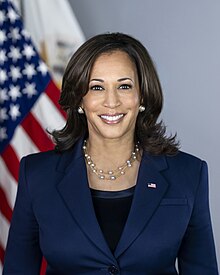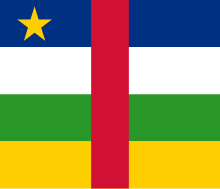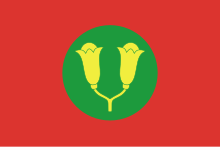Portal:Politics
| Main | Topics and categories | Tasks and projects |
The Politics portal
Politics (from Ancient Greek πολιτικά (politiká) 'affairs of the cities') is the set of activities that are associated with making decisions in groups, or other forms of power relations among individuals, such as the distribution of status or resources. The branch of social science that studies politics and government is referred to as political science.
Politics may be used positively in the context of a "political solution" which is compromising and non-violent, or descriptively as "the art or science of government", but the word often also carries a negative connotation. The concept has been defined in various ways, and different approaches have fundamentally differing views on whether it should be used extensively or in a limited way, empirically or normatively, and on whether conflict or co-operation is more essential to it.
A variety of methods are deployed in politics, which include promoting one's own political views among people, negotiation with other political subjects, making laws, and exercising internal and external force, including warfare against adversaries. Politics is exercised on a wide range of social levels, from clans and tribes of traditional societies, through modern local governments, companies and institutions up to sovereign states, to the international level.
In modern nation states, people often form political parties to represent their ideas. Members of a party often agree to take the same position on many issues and agree to support the same changes to law and the same leaders. An election is usually a competition between different parties.
A political system is a framework which defines acceptable political methods within a society. The history of political thought can be traced back to early antiquity, with seminal works such as Plato's Republic, Aristotle's Politics, Confucius's political manuscripts and Chanakya's Arthashastra. (Full article...)
Selected article
Feminism is a collection of movements and ideologies aimed at defining, establishing, and defending equal political, economic, and social rights for women. In addition, feminism seeks to establish equal opportunities for women in education and employment. A Feminist is "an advocate or supporter of the rights and equality of women". Feminist theory, which emerged from these feminist movements, aims to understand the nature of gender inequality by examining women's social roles and lived experience; it has developed theories in a variety of disciplines in order to respond to issues such as the social construction of sex and gender. Some of the earlier forms of feminism have been criticized for taking into account only white, middle-class, educated perspectives. This led to the creation of ethnically specific or multiculturalist forms of feminism. Feminist activists campaign for women's rights – such as in contract law, property, and voting – while also promoting bodily integrity, autonomy, and reproductive rights for women. Feminist campaigns have changed societies, particularly in the West, by achieving women's suffrage, gender neutrality in English, equal pay for women, reproductive rights for women (including access to contraceptives and abortion), and the right to enter into contracts and own property. Feminists have worked to protect women and girls from domestic violence, sexual harassment, and sexual assault. They have also advocated for workplace rights, including maternity leave, and against forms of discrimination against women. Feminism is mainly focused on women's issues, but because feminism seeks gender equality, some feminists argue that men's liberation is a necessary part of feminism, and that men are also harmed by sexism and gender roles.
Featured picture

David Ben-Gurion (born David Grün; 16 October 1886 – 1 December 1973) was the primary national founder of the State of Israel and the first Prime Minister of Israel. Adopting the name of Ben-Gurion in 1909, he rose to become the preeminent leader of the Jewish community in British-ruled Mandatory Palestine from 1935 until the establishment of the State of Israel in 1948, which he led until 1963 with a short break in 1954–55.
Selected quote
Selected biography
Han Sorya (Korean: 한설야, born Han Pyŏngdo; 3 August 1900 – 6 April 1976) was a Korean writer, literary administrator and politician who spent much of his career in North Korea. Regarded as one of the most important fiction writers in North Korean history, Han also served as head of the Korean Writers' Union and Ministry of Education.
During his career, Han survived a number of purges that were caused by factional strife within the Workers' Party of North Korea, to become a member of the Central Committee of the Workers' Party of Korea. Han, motivated by personal grievances against his rival writers, sometimes acted as the force behind the purges within the cultural establishment as well. Han himself was purged in 1962. In his works, Han offered some of the earliest known contributions to the cult of personality of Kim Il-sung. His influence is felt in North Korea even today, though his name has been forgotten from official histories. Han's best-known work, the anti-American novella Jackals, however, has been invoked in the 2000s.
Did you know (auto-generated) -

- ... that Checheyigen's political acumen ensured that her family became one of the most powerful in the Mongol Empire?
- ... that a year after becoming the first woman president of the Canadian Political Science Association, Caroline Andrew moderated the first Canadian leaders' debate on women's issues?
- ... that Nirmalendu Goon shared his doubts about Sheikh Mujibur Rahman's political decisions during the 1969 East Pakistan mass uprising in his poem Huliya?
- ... that no single political party has a mandate in a coalition government?
- ... that following the Russian invasion of Ukraine, a diverse group of exiled Russian public figures formed the Anti-War Committee of Russia to unite different political movements to oppose the war?
- ... that Babydog is "a fixture in West Virginia politics"?
More did you know...
- ...that the first phase of Mitt Romney's 2012 U.S. presidential campaign was announced via a video message?
- ...that the 1968 pamphlet Is the School House the Proper Place to Teach Raw Sex? claimed that sex education was a Communist conspiracy?
- ...that the American Society of Magazine Editors book The Best American Magazine Writing 2007 features investigative journalism about the Beslan school hostage crisis and survivors of Agent Orange?
- ...that the Libyan opposition has embraced "Zenga Zenga", an Israeli-created auto-tuned song and viral YouTube video that parodies Libyan ruler Muammar Gaddafi (pictured)?
- ...that the UK's Workers Socialist Federation began as a suffragette group?
- ...that the controversial Iraq De-Ba'athification policy banned anyone affiliated with the Ba'ath Party from working in the public sector?
In this month
- December 7, 2003 – the Conservative Party of Canada is formed.
- December 13, 2000 – The U.S. Supreme Court stops the Florida presidential recount, effectively giving the state, and the Presidency, to George W. Bush.
- December 6, 2005 – David Cameron becomes the 26th Leader of the British Conservative Party
- December 15, 2005 – Parliamentary elections are held in Iraq.
- December 17, 2005 – Evo Morales wins the presidential elections in Bolivia, ousting incumbent Eduardo Rodriguez and becoming the country's first indigenous leader.
- December 18, 1834 – Sir Robert Peel publishes the Tamworth Manifesto which lays the foundation for the modern British Conservative Party.
- December 30, 2006 – Former Iraqi dictator, Saddam Hussein is hanged.
News and Current events
- August 11: 4 local government areas in New South Wales, Australia locked down after COVID-19 case
- August 11: Australia: AstraZeneca vaccine access expanded by Victorian government
- August 1: Australia: Victorian lockdown lifted
- July 29: Tunisia's president dismisses prime minister, suspends parliament
- July 25: Australia: Wikinews interviews Reg Kidd, mayor of the City of Orange, about COVID-19 lockdown and local government
- July 23: South Australia enters week-long lockdown to contain COVID-19 Delta variant spread
- July 21: Technological University Dublin senior lecturer Dr Lorcan Sirr speaks to Wikinews on housing market in Ireland
- July 21: Three rural councils in New South Wales, Australia enter 7-day lockdown
- July 21: Australia: Victoria lockdown extended by a week with 85 active cases recorded
- July 15: California governor signs new state budget, eligible Californians to get stimulus payments
Topics and categories
General images
Related portals
Associated Wikimedia
The following Wikimedia Foundation sister projects provide more on this subject:
-
Commons
Free media repository -
Wikibooks
Free textbooks and manuals -
Wikidata
Free knowledge base -
Wikinews
Free-content news -
Wikiquote
Collection of quotations -
Wikisource
Free-content library -
Wikiversity
Free learning tools -
Wiktionary
Dictionary and thesaurus

























































